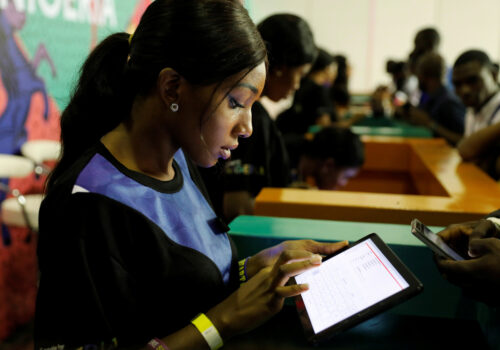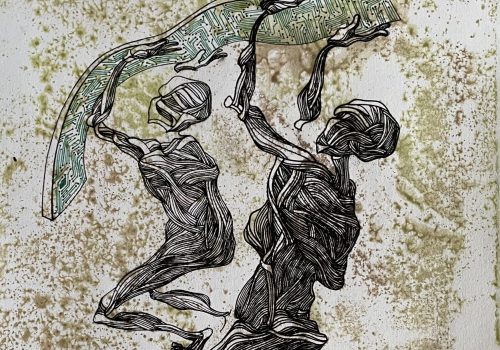Biometrics and digital identity in Africa
Bottom lines up front
- Forty-nine African countries now operate biometric systems, with foreign vendors dominating a market that controls the continent’s most sensitive identity infrastructure.
- An estimated half a billion Africans lack identity documents, driving governments to deploy biometric systems rapidly. Still, weak governance frameworks often mean these technologies exclude the very populations they’re intended to serve.
- From Uganda’s Ndaga Muntu to Kenya’s Huduma Namba, biometric deployments across Africa face common challenges: data breaches, corruption in enrollment processes, exclusion of elderly citizens, and the use of facial recognition to monitor political dissent.
Executive summary
The rapid adoption of biometric and digital identification systems is transforming governance and public administration across Africa. Promoted as tools to modernize service delivery, enhance electoral integrity, and strengthen state capacity, these systems are becoming central to how identity and citizenship are managed. From national identification schemes and voter registration to border management and SIM card registration, biometrics have become deeply embedded in Africa’s political, social, and economic landscape.
However, this technological expansion comes with profound risks. Weak legal frameworks, limited oversight, and a growing reliance on foreign vendors have created an ecosystem vulnerable to privacy breaches, state surveillance, and systemic exclusion. Biometric systems increasingly integrate electoral and civil identity data, giving governments vast surveillance capabilities while disenfranchising marginalized groups such as rural communities, migrants, and individuals without foundational IDs.
The report explores the main use cases driving biometrics and digital identification systems in Africa, focusing on their governance, vendor dynamics, and human rights impacts. Key areas include national identification and civil registration, which provide the foundation for legal identity and access to services; immigration management; elections, where they strengthen voter registration and authentication; and smart city initiatives, which leverage digital IDs for efficient service delivery and urban governance.
The research reveals that foreign technology firms dominate Africa’s biometric ecosystem; that forty-nine African countries have at least one form of biometric system; and thirty-five out of the fifty-four countries on the continent use biometrics in their election processes. Companies such as Idemia (France), Semlex (Belgium), Veridos (Germany), Thales (France), and Huawei (China) provide the core technology, hardware, and algorithms that underpin these systems. African governments often finance these projects through loans from international institutions like the World Bank, creating dependencies that shape procurement and governance practices.
While biometric systems are often introduced to improve electoral processes and service delivery, their fragmented rollout forces citizens to repeatedly submit sensitive data across multiple platforms, increasing costs and risk of fraud. Many projects lack transparency, with procurement processes shielded under the guise of national security. Public knowledge of these systems remains low: a sample study in three countries by ICT Works found that only 38 percent of surveyed citizens were aware of their governments’ purchases of biometric, facial recognition, or AI systems, highlighting a significant transparency gap.
To mitigate these risks, the report offers seven key policy recommendations:
- Strengthening independent oversight bodies free from political interference;
- Enacting comprehensive data protection laws covering the full life cycle of biometric data;
- Ensuring transparent, participatory deployment processes; Integrating human rights due diligence into all projects;
- Establishing continuous oversight and remedies for rights violations;
- Protecting electoral integrity and preventing the over-integration of ID systems;
- Embedding a rights-based governance model rooted in privacy, equality, and non-discrimination.
The findings underscore that biometric and digital identity systems must not be viewed merely as technical tools for modernization. They are inherently political, with the potential to either strengthen democratic governance or entrench authoritarian control. Without robust reforms, these systems risk becoming instruments of exclusion and surveillance rather than empowerment.
read the full report
About the authors
Sani Suleiman Sani is a policy and research strategist shaping continental dialogue on digital rights, technology governance, and inclusive innovation in Africa. He leads the research portfolio at Paradigm Initiative, where he oversees multi-country studies that inform legislative processes, corporate accountability, and global debates on digital policy.
Thobekile Matimbe is a human rights lawyer and Senior Manager Partnerships and Engagements at Paradigm Initiative (PIN) where she dedicates her skills to the advancement of digital rights and inclusion in Africa and beyond.
Kenton Thibaut is a senior resident China fellow at the Atlantic Council’s Digital Forensic Research Lab (DFRLab), where she leads China programming for the Democracy + Tech Initiative, and a resident senior fellow at the Atlantic Council’s Indo-Pacific Security Initiative (IPSI) at the Scowcroft Center for Strategy and Security.
Iria Puyosa is a senior research fellow at the Atlantic Council’s Democracy+Tech Initiative. She specializes in the complex interplay between technology and political dynamics.
Acknowledgements
This report was made possible with support from the Embassy of Denmark in the United States. The Digital Forensic Research Lab (DFRLab) would also like to thank the Paradigm Initiative for contributing writing and research.
related content
Explore the programs

The Atlantic Council’s Digital Forensic Research Lab (DFRLab) has operationalized the study of disinformation by exposing falsehoods and fake news, documenting human rights abuses, and building digital resilience worldwide.

The Democracy + Tech Initiative creates policy practices that align global stakeholders toward tech and governance that reinforces, rather than undermines, open societies. It builds on the DFRLab’s established track record and leadership in the open-source field, empowering global communities to promote transparency and accountability online and around the world.
Image: Eye scan, conceptual illustration. Science Photo Library via Reuters Connect

